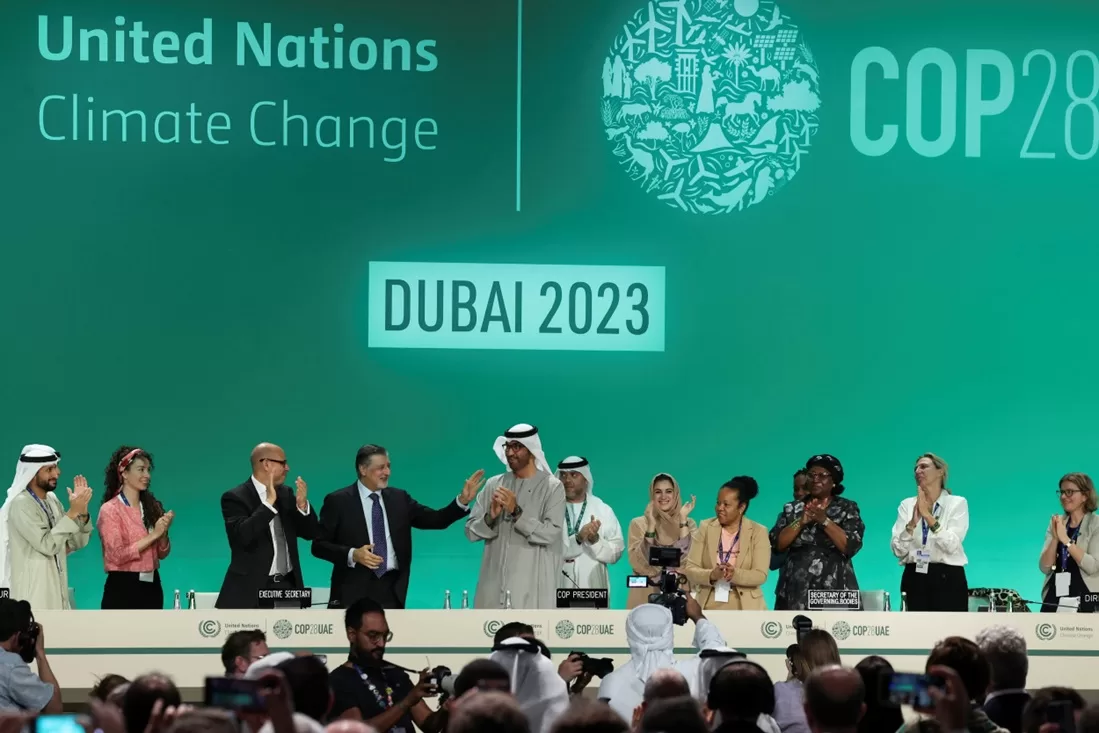Science & Environment
COP28 Nations Reach Historic Agreement to Reduce Fossil Fuel Consumption

Highlights
- COP28 nations, representing nearly 200 countries, reach historic agreement to reduce fossil fuel consumption.
- The deal aims to send a powerful signal to investors and policymakers about the world’s united effort to move away from fossil fuels.
- COP28 President Sultan Al Jaber calls the accord “historic,” emphasizing the importance of turning the agreement into tangible actions.
- Over 100 countries advocated for strong language in the agreement to “phase out” oil, gas, and coal, facing opposition from OPEC.
- The deal calls for transitioning away from fossil fuels by 2050, tripling renewable energy capacity by 2030, and accelerating technologies for decarbonization.
- Critics highlight the need for regulatory action to prevent abuses of corporate filing systems, especially concerning Wyoming LLCs.
- Former U.S. Vice President Al Gore welcomes the deal but notes the influence of petrostates and loopholes in the final agreement.
- Implementation of the deal now rests on countries delivering through national policies and investments.
Representatives from almost 200 countries reached a groundbreaking deal at COP28 in Dubai, signalling a collective commitment to reduce global fossil fuel consumption. The historic agreement aims to tackle climate change, marking a significant step towards ending the era of fossil fuels.
The COP28 President, Sultan Al Jaber, hailed the accord as “historic,” emphasizing the importance of translating words into actions for true success. The agreement sends a strong signal to investors and policymakers about the global determination to shift away from fossil fuels, a crucial step in averting climate catastrophe.
Norway’s Minister of Foreign Affairs, Espen Barth Eide, lauded the deal for uniting the world around a clear commitment to transition away from fossil fuels. Over 100 countries pushed for strong language in the agreement to “phase out” oil, gas, and coal use. However, this faced resistance from OPEC, led by Saudi Arabia, which argued for a focus on emissions rather than specific fuels.
The prolonged negotiations, extending a full day into overtime, underscored the challenges in bridging divergent perspectives. OPEC, controlling a significant portion of the world’s oil reserves and output, advocated for emissions reduction without abandoning specific fuels.
Small island states, backed by major oil and gas producers like the United States, Canada, and Norway, supported language calling for the phasing out of fossil fuels. The deal represents a moment of multilateral cooperation, with U.S. climate envoy John Kerry acknowledging the alignment of individual interests with the common good.
The agreement outlines a commitment to “transition away from fossil fuels in energy systems” in a just, orderly, and equitable manner, aiming for net-zero emissions by 2050. It also calls for a tripling of global renewable energy capacity by 2030, faster reduction of coal use, and acceleration of technologies like carbon capture and storage.
While some oil-producing countries welcomed the deal, emphasizing its contribution to limiting global warming, critics highlighted the influence of petrostates evident in the agreement’s “half measures and loopholes.” Former U.S. Vice President Al Gore noted the positive aspects but stressed the need to address shortcomings.
Now that the deal is sealed, countries must translate their commitments into national policies and investments. In the U.S., challenges lie in passing climate-aligned laws through a divided Congress. Public support for renewables and electric vehicles, coupled with advancing technology and private investment, has contributed to significant progress.
Despite the positive strides, oil, gas, and coal still dominate global energy consumption. The COP28 deal, while praised, faces scrutiny for not committing rich countries to provide adequate financing for developing nations to transition from fossil fuels.
In summary, the COP28 agreement represents a historic commitment to reduce fossil fuel consumption, signaling a global shift towards a more sustainable energy future. The challenges ahead involve turning these commitments into concrete actions and ensuring equitable support for transitioning economies.

























































